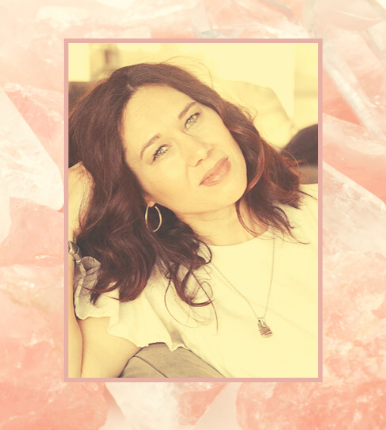Welcome to Soul Chat – Be Inspired by Thriving Women.
Meet Sonia Voldseth – counsellor, seeker and writer.
Sonia, you provide counselling to clients. What does this involve?
It really depends. On the person, how they learn and heal, what they’re facing, and whether they want short or long-term counselling. Some people want symptom relief in the form of tools and strategies, and some people want to explore more thoroughly what’s led them to the place they’re in.
Also, everyone works differently. Some clients respond better to more logical and rational ways of working, and some to more creative or soulful ways of working. Sometimes a person will really resonate with drawing or illustrating in the sand, whilst others will resonate more with more linear and structured ways of working.
There’s a perception that you go to counselling and it’s a very passive process. That someone is going to ask you “how do you feel about that?” repeatedly. In my experience, that’s not true. I rarely ask that question.
My goal is to work collaboratively with the person to figure out what their goals are for treatment, what makes the most sense to them, and then to check in over time to see if we’re meeting those goals.
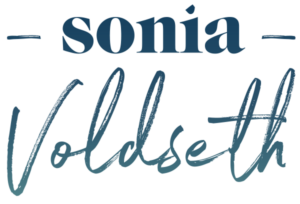
You became a counsellor because you “were always interested in the human condition…”. What is it about humans that so intrigues you?
Oh gosh, everything? The way we experience joy, the knowing that suffering is common to us all, the layers of ‘stuff’ that both hinders and protects us. It’s endlessly fascinating to me that we manage to survive the human condition at all.
As a species, we share so many contrasting qualities – both compassionate and brutal. We can be so resilient in the face of hardship and so incredibly vulnerable at the same time.
I think that’s beautiful.
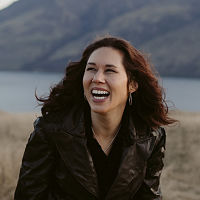
Your motivation to become a counsellor was born from your lived experience. Tell us how your journey has shaped your current path.
I was always interested in the social sciences such as psychology and sociology. But I did what I thought would make others proud of me, and what was considered ‘successful’. I thought I’d go into farming and ranching but ended up going into agricultural policy instead.
There were really amazing parts, but it wasn’t the path for me. We can be good at something, even great. But it doesn’t mean it’s the right something.

Sonia, you trained as a lawyer and worked in the corporate world of Washington. It sounds very glamourous. Was it?
Hmmmm, parts of it were. Prior to getting my law degree, I worked for a Senator and then as a lobbyist. As part of the team, I wrote and analysed laws we wanted to get passed and tried to form alliances with like-minded folks to work together on legislative ambitions.
It’s true that making laws is much like making sausage. It’s messy and you don’t always want to know the actual process. That wasn’t glamorous.
The parts that seemed glamorous were the ‘wining and dining’, the power in politics, and the idea that you were making a difference.
Twenty years ago, there was certainly a political divide but it wasn’t so personal. At the end of the day, we’d all go out together regardless of our political persuasion. We didn’t hate each other because we had different ways of seeing the world. It makes me sad and angry to see the state of things in the U.S. today.
Also, as I look back from an older, wiser place, the wining and dining was really just money buying votes – and the power was misplaced in the perpetuation of systems that benefit a few rather than many.
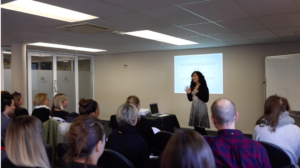
What was your experience of being a woman in the world of politics and law?
In a word, unacceptable. There was and is, a misogynist culture in both those fields.
On the Senate policy team, I was the only female at the time. I needed to fit in so I went along with going to the strip clubs and cigar bars even when it didn’t feel good. I wasn’t strong enough to say no when I needed to succeed. Sexual harassment was also common and tolerated.
As a lobbyist though, I was lucky. I had two male bosses that always had my back. I remember one time a man (around 60, white) sent me away from a meeting. My boss was supposed to attend but couldn’t. I felt so ashamed and worthless. I was a small town 25 year old girl, far away from home, being sent back across town.
When I returned to the office, the vice president of the association blew up, called that man and strongly suggested he call me to apologise (which he did). I’ll never forget that act of kindness and affirmation.
Law is still a real boys club. I practiced for a short time in Christchurch and it did my head in.

You say that therapy ‘changed everything’ for you. How has it helped you to live your life with integrity; to accept yourself and move forward?
Accepting myself as I am rather than what other people expect of me has been the greatest gift of therapy. As we learn to rely on our internal guidance system rather than external expectations, we are able to walk differently through the world.
Of course, it takes time, healing, setting new parameters, and settling into and integrating them. It’s an ongoing process. But I’m truly grateful for the opportunities I’ve had to heal.
Black communities, indigenous communities, and other people of colour often don’t have the financial opportunity to seek therapy. They are the most negatively impacted by the colonised and patriarchal systems we live within and should have more and better access to mental health services. That needs to change.
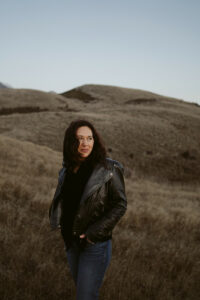
How do past traumas/difficulties affect us and how can heal and move forward?
In all sorts of ways.
From a mental and emotional standpoint, they impact the way we think and what we believe about ourselves. Our thoughts fuel our emotions (negatively or positively), and our emotions fuel our behaviour. For example, if I believe my partner doesn’t want to hear what I have to say, I might feel angry, sad, disappointed or worthless (or all those things). In turn, I might shut down/withdraw or lash out because I feel bad.
But we can’t just change our thoughts from negative to positive all of a sudden. That can actually make us feel worse. It’s a process.
Maybe it’s using mindfulness to learn to observe thoughts and emotions. Maybe it’s learning to rationalise them differently. Maybe it’s figuring out the story. Maybe it’s learning communication strategies to let our partner know how we feel. Maybe it’s getting in touch with different parts of us.
Once we begin to heal aspects of what makes us tick, we can move forward differently.
Past trauma can also impact us physically. It can show up as migraines, gut issues, skin issues, hormonal imbalances, backaches, etc. These things have not happened because you’re not ‘spiritual enough’ or ‘healed enough’. It’s happened, and there are ways forward, but blaming yourself is never useful.
The most healing thing I’ve learned about past trauma is to recognise that your brain and body are always doing the best they can to protect you. As you unpack the reasons you’ve felt unsafe and work to feel safer in the world, that in itself is healing.

Long ago, I (Kate) believed there was something wrong with me when I first visited a therapist for my wellbeing. Is the perception of mental health changing?
I hear you! I felt the same way.
I didn’t tell anyone that I was depressed or anxious at the time it was going on for me. In fact, it took me a very long time to even admit it to myself because of the stigma our generation and generations before have been subjected to.
I do see it changing – which is such a positive and welcome development. Millennials seem much more open about seeking and participating in therapy, and that’s fantastic.
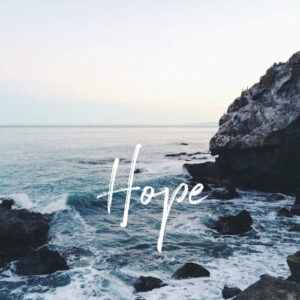
I love this quote, “Issues are like belly buttons. We all have them.” Would you agree that we are all going to experience pain, challenge or hardship sometime? So to seek help is a normal part of being human?
Ha, ha! I spoke at my daughter’s class and used that quote. She was so embarrassed. I’m glad you like it.
Yes, I think we are all going to experience pain and hardship. Many great teachers have told us that. Buddhism does a beautiful job of outlining that to be human is to suffer. The way we respond to our suffering will determine how we feel. Of course, this is easy in theory and more difficult in practice. But as we learn to observe how we are feeling as opposed to being attached to, or caught up in those feelings, we can release the need to suffer so much.
And absolutely, yes it is ‘normal’ to seek help! No one taught us how to deal with suffering except to run from it, or use substances to manage it, or distract ourselves from it in some way.
So, of course we need help to manage suffering. We see a mechanic to fix our car’s issues. Why wouldn’t we see a mental health professional to deal with what is difficult in our lives?

You grew up on a ranch in Montana, USA, met a Kiwi and now live in Aotearoa. From your experience of the two countries, what strikes you as the blessings of living in New Zealand?
The blessings of Aotearoa are many. Comparatively, I find Aotearoa to be much more progressive politically. A small country affords more opportunity for pragmatism in politics, as does MMP. It doesn’t work perfectly but it does prevent the gridlock of a two party system.
Te Tiriti o Waitangi (Treaty of Waitangi) provides an awareness and acceptance that colonisation occurred and needs to be addressed. I know that mental and physical health outcomes for Māori are worse, that arrests and imprisonment for Māori and Pasifika peoples are higher, and that education outcomes are lower than Pakeha. It’s clear we have a long way to go and much work as Pākehā and tauiwi to do.
From my perspective as an American, the fact that colonisation in Aotearoa is acknowledged feels important. I worry that may still be a long way off in mainstream America.
Overall, I’m just so proud and happy to live in such a beautiful country where it’s possible for me to thrive, and where we are safe.
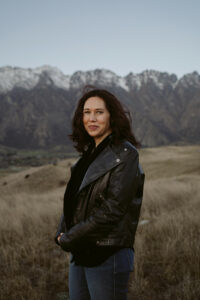
What are your ‘go to’ practices to keep yourself thriving?
Meditation, the gym, yoga and writing.
Stopping to look around and appreciate what I have.
Allowing people to love me as much as I love them.

You have a range of formal qualifications as well as an appreciation for books, podcasts and workshops. Would you consider yourself a ‘forever student’, hungry to keep learning and understanding our world?
So much, yes. I’m lucky that’s an innate part of me.
On my Clifton Strengths profile, learner is one of my top strengths.
I’m not happy if I’m not learning – and especially anything therapy/healing/sociology/systems related.
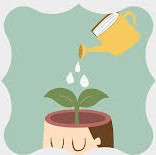
Any inspiring books, podcasts & short courses you would recommend?
Books:
- The Body Keeps the Score, Bessel van der Kolk
- Untamed, Glennon Doyle
- The Seat of the Soul, Gary Zukav
- The Power of Now, Eckhart Tolle
- The Upward Spiral, Alex Korb
- Getting the Love You Want, Harville Hendrix & Helen LaKelly Hunt
- Unbound: A Woman’s Guide to Power, Kasia Urbaniak
- Getting Unstuck, Pema Chodron
Podcasts:
- We Can Do Hard Things, Glennon Doyle
- Unlocking Us, Brene Brown
- Where Should We Begin? Esther Perel
- On Being, Krista Tippett
- My Dad Wrote a Porno, Jaime Morton (because sometimes we all need a laugh).
Short Courses:
The National Institute for the Clinical Application of Behavioural Medicine (NICABM) has some great online courses on all kinds of mind/body connection wisdom and knowledge. These can be downloaded and kept forever.
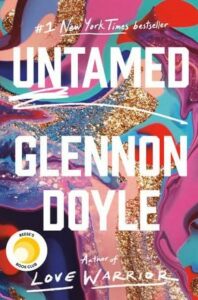
What wisdom would you share with other women about living their truth?
- Take the time to figure out your own expectations of yourself.
- Learn from other women.
- Ask for help.
- Rest when you can.
- Play.
- No one says at the end of their life that they wished they’d worked harder.

To learn more about Sonia head to
https://www.soniavoldseth.com/
